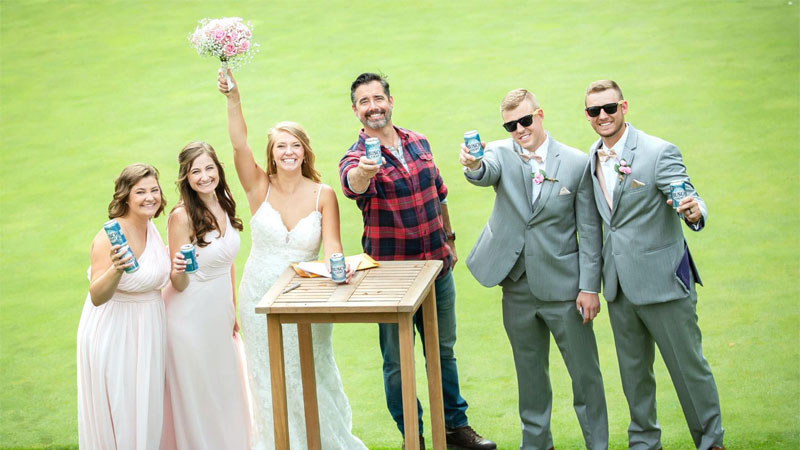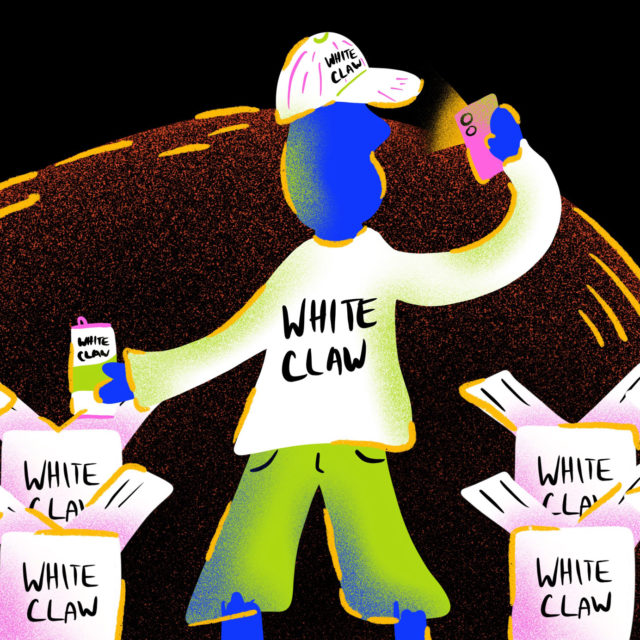When Paul Corgan, a 26-year-old from Portsmouth, N.H., sent his online application to become White Claw’s “best life ambassador” in March 2018, he completed a short blurb and shared a photo and link to his Instagram account. After clicking submit, he forgot about the competition almost immediately.
The contest would grant two winners $60,000 each to travel America for six months. Their only requirement was to document themselves “living their best life” by posting one photo per week to Instagram featuring the up-and-coming hard seltzer brand.
Articles detailing the competition went viral across social media platforms. So by the time Corgan received an email in June 2018 informing him he was one of five finalists being considered for the role, he still assumed his chances of winning were slim. Then, just over a week later, after a Skype interview with the brand’s marketing department, he awoke to an email.
“It just said ‘Congratulations’ as the subject line,” Corgan says. “It was the most exciting thing that had happened to me in my life.”
Contest Marketing: Everyone’s a Winner
For active social media users, competitions like White Claw’s “Best Life Contest” will be a familiar concept. While their prizes often seem too good to be true, the bar for entry is remarkably low.
All that’s usually required is to follow the brand on a social media platform and share a post or photo tagging its account, often using a specific hashtag. In advertising lingo, the concept is known as contest marketing; it’s a savvy promotional strategy and one that an increasing number of alcohol brands are turning to.
Within the past year alone, Natural Light has run a range of social-media-driven competitions with prizes including free beer for a year, $10,000 for a Halloween costume contest, and $1 million to help 25 drinkers pay off their graduate school loans.
Guinness, meanwhile, offered drinkers the keys to their very own Irish pub for a weekend, while Keystone Light launched a “Free Rent” campaign that paid 13 lucky winners’ rents for a year. In May 2019, Busch Beer announced it would contribute $25,000 toward one couple’s wedding ceremony and would send its spokesman, Gerald Downy, better known as “Busch Guy,” as the officiant.

These contests present a win-win scenario: Contestants commit to a small social media interaction, and brands generate buzz at a fraction of the cost of traditional advertising. Plus, the headline-grabbing nature of the campaigns all but guarantees nationwide coverage from numerous media outlets. (VinePair was one of several drinks publications that picked up the White Claw campaign, and even national news outlets like CNBC covered the contest.)
But while the contests themselves gain widespread coverage, the actual winners often go almost unreported.
When Fox 32 Chicago covered the Busch wedding contest in May 2019, the story received close to 40,000 likes, over 11,000 shares, and upwards of 20,000 comments on Facebook, according to data from content marketing research platform BuzzSumo. Despite such a positive reaction, Fox didn’t bother announcing the winners — the now-wed Abbi and Andrew Roth of Janesville, Wis. — nor did it follow up on the contestants to find out how the big day went.
The only coverage of the Roths’ wedding day appears to be a July 2019 article in Janesville’s Gazette Xtra. “We’re just a couple of regular Joes,” Abbi Roth told the publication. “We never thought this would happen.”
The “Lucky” Winners
While the Roths may be a pair of Busch-Light-loving “regular Joes,” success in other competitions — those that call upon the winner to fulfill a specific role — rely on more than brand alignment or fandom.
Prior to working as a White Claw ambassador, Corgan ran his own company that handled the social media accounts for small restaurants and businesses. He points to luck as a huge factor in winning the Best Life Contest; but he also says his love of travel, which he emphasized in his online application and interview, as well as his photography skills and knowledge of social media, helped him stand out and eventually win the contest.
In August 2018, Mr Fogg’s, a London mini-chain of bars inspired by the novel “Around the World in Eighty Days,” announced it was looking for an adventurous individual to travel the world, drink gin, and collect botanicals to inspire a cocktail for the bar upon their return. The winner would also get to choose a travel companion to join them on their escapade.
Numerous publications (including, again, VinePair) covered the competition, which gained even more online traction after actor and Aviation gin owner Ryan Reynolds tweeted about it.
I’ll do it.
— Ryan Reynolds (@VancityReynolds) August 16, 2018
To enter the competition, candidates applied on Mr. Fogg’s website and had to prove they were social media savvy, over 21 years of age, and skilled at writing and photography. Previous travel experience was also imperative.
“We didn’t think there was any chance we were going to get it because you never do with these things,” Jessica Last, the winning contestant, says. “But at the same time, we did feel all the questions that they asked were really relevant to what we were already doing: We were adventure/travel photographers and bloggers on a very small scale.”
When Last, a 30-something London resident, won the competition, she selected her longtime travel companion Charlie Wild to join her on the trip. The pair had recently returned from an eight-month, around-the-world adventure that they documented together on their blog, The Travel Project, after previously quitting their jobs in advertising.
Mr. Fogg’s enlisted the help of British explorer, writer, and photographer Levison Wood to pick the winners from more than 10,000 applicants. Resumes arrived from across the globe, including New Zealand, the U.S., Argentina, and Bermuda. According to a 2018 interview in trade publication Hospitality & Catering News, Woods picked Last because of her “genuine” passion for travel, and her “beautifully shot” Instagram photos.
Winning the Contest: What Happens Next?
Within two months of finding out he’d won the White Claw contest, Corgan was in the brand’s Chicago headquarters learning about the company values, discussing travel plans, and tasting the difference between White Claw and rival hard seltzer brands.
The aim of the immersion course was to prepare him and the other contest winner for their new, temporary ambassadorial roles. The position, he soon learned, would be remarkably self-driven. “The team over at White Claw was amazing,” he says. “They were really open to our ideas of what we wanted to do and where I wanted to travel.” (Corgan and the other winner traveled independently, but they did cross paths briefly in Denver during the six-month excursion.)
View this post on Instagram
As advertised, the winners were given the freedom to travel as they pleased, he says. “We just had to share one [Instagram] feed post a week about what we were doing, where we were going, and how we were living our best life with White Claw,” Corgan says.
Last and Wild, meanwhile, were whisked off on the worldwide gin trip in even quicker fashion. Though she doesn’t recall the exact time frame, Last estimates they set off within a few weeks of finding out she’d won in August 2018. The fact they were both working in freelance roles allowed them to drop everything and jet off at a moment’s notice. “It was all a bit of a whirlwind and continued that way till we got back,” she says.
Life on the Road
While Last and Wild’s journey was slightly more prescriptive than Corgan’s adventure (the pair followed in the footsteps of Phileas Fogg, the protagonist in “Around the World in Eighty Days” and the namesake of Mr. Fogg), Last says they were given free rein on what they did in each country they visited (seven in total over a 72-day period).
The highlights of their trip included a visit to an Indian tea plantation in Darjeeling, cycling across eight islands in Japan, learning about micro herbs in Singapore, and discovering the incredible cocktail scene in Mumbai. Perhaps the biggest “high” was taking to the skies in a hot air balloon in the U.S., Last says, adding, “I’ve always wanted to do that.”
Corgan set off from New Hampshire at the end of August 2018 and embarked on a 12,000 mile, three-month road trip across America to the Pacific Northwest, and then south to California. He toured various national parks and also ticked off a major bucket list item along the way.
“My grandfather was a senator in North Dakota back in the ‘30s and he helped establish Grand Teton National Park,” Corgan says.
After the road trip finished, Corgan planned his remaining experiences around the things in life he’s passionate about. He visited New Orleans because of his love of music (Corgan shares piano tutorials on YouTube), went camping in Hawaii, and piloted a plane in Miami. The latter forced him to get creative when it came to sharing the experience on Instagram — “you can’t fly a plane while drinking hard seltzer,” he says — while other unexpected obstacles presented their own challenges.
“There was a time driving through Wyoming where I couldn’t find a single can of White Claw because there was a national shortage,” he says. “A lot of my friends thought I was going around with a truck of White Claw and promoting it at fairs and stuff.”
In reality, Corgan purchased the cans for his photos on the road, so when the shortage hit, “I had to just travel until I found a liquor store that had some,” he says. “They were sold out for miles and miles, so I just postponed shooting that week.”
View this post on Instagram
Luck Favors the Experienced
When the first deposit for his White Claw adventure landed in his bank account, Corgan was on the shop floor of a men’s clothing store where he supplemented the income from his social media business as a part-time sales associate. “It was the craziest moment ‘cause I was there selling stuff, but I was smiling so much,” he recalls. “I was like, ‘O.K., I don’t have to be here at all.’”
After his six-month gig, Corgan started a new content creation company, Content Club Co., providing curated photos and videos for brands he feels strongly about, like Timberland, La Colombe, and Underwood.
“My life is completely different now than it would have been had I not won,” Corgan says.
So was it luck or skill? Probably a combination of the two. But if you find yourself procrastinating on social media and stumble across an alcohol-fueled opportunity of a lifetime, just remember: It could be you.
